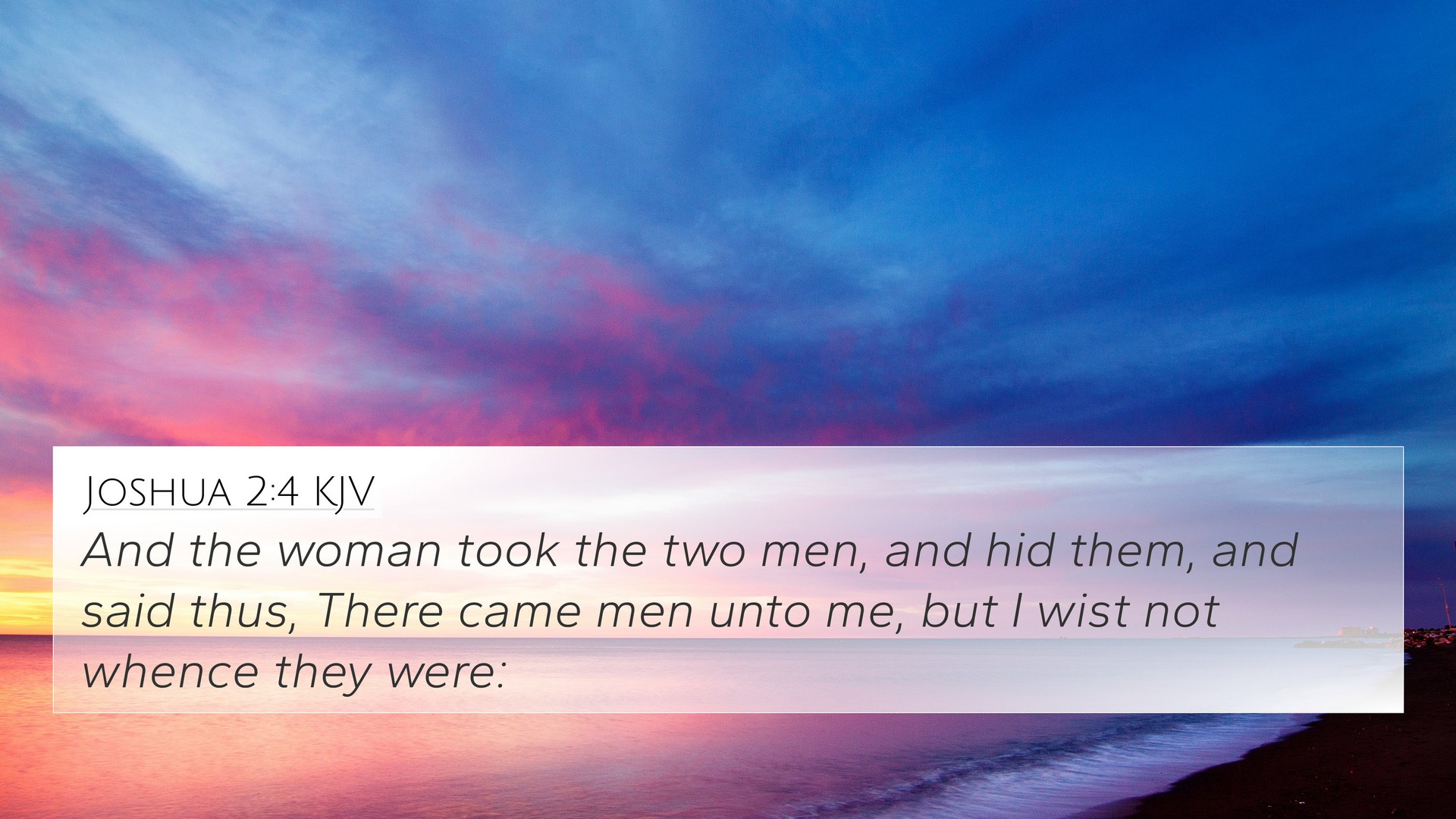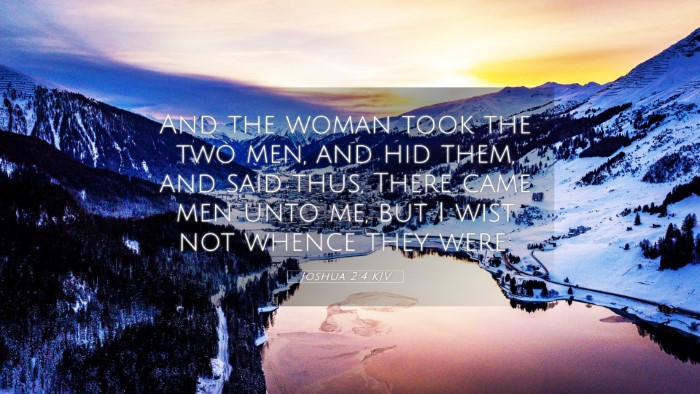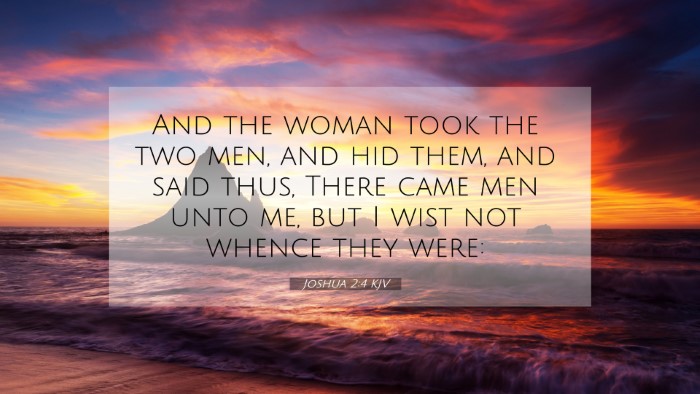Old Testament
Genesis Exodus Leviticus Numbers Deuteronomy Joshua Judges Ruth 1 Samuel 2 Samuel 1 Kings 2 Kings 1 Chronicles 2 Chronicles Ezra Nehemiah Esther Job Psalms Proverbs Ecclesiastes Song of Solomon Isaiah Jeremiah Lamentations Ezekiel Daniel Hosea Joel Amos Obadiah Jonah Micah Nahum Habakkuk Zephaniah Haggai Zechariah MalachiJoshua 2:4 Similar Verses
Joshua 2:4 Cross References
And the woman took the two men, and hid them, and said thus, There came men unto me, but I wist not whence they were:
Uncover the Rich Themes and Topics of This Bible Verse
Listed below are the Bible themes associated with Joshua 2:4. We invite you to explore each theme to gain deeper insights into the Scriptures.
Joshua 2:4 Cross Reference Verses
This section features a detailed cross-reference designed to enrich your understanding of the Scriptures. Below, you will find carefully selected verses that echo the themes and teachings related to Joshua 2:4 KJV. Click on any image to explore detailed analyses of related Bible verses and uncover deeper theological insights.
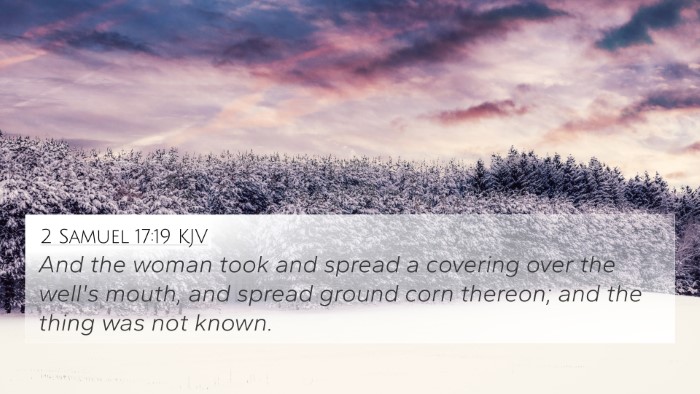
2 Samuel 17:19 (KJV) »
And the woman took and spread a covering over the well's mouth, and spread ground corn thereon; and the thing was not known.
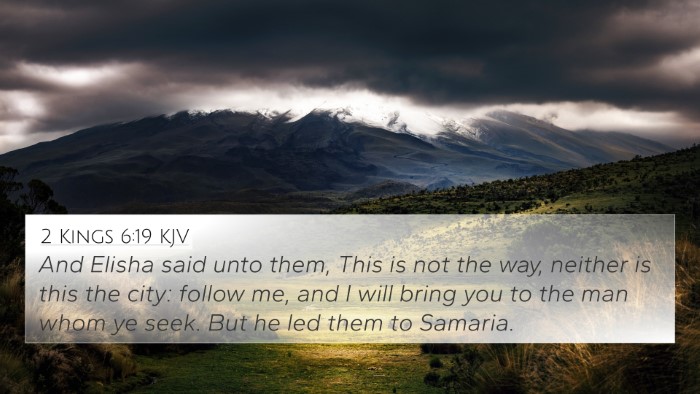
2 Kings 6:19 (KJV) »
And Elisha said unto them, This is not the way, neither is this the city: follow me, and I will bring you to the man whom ye seek. But he led them to Samaria.
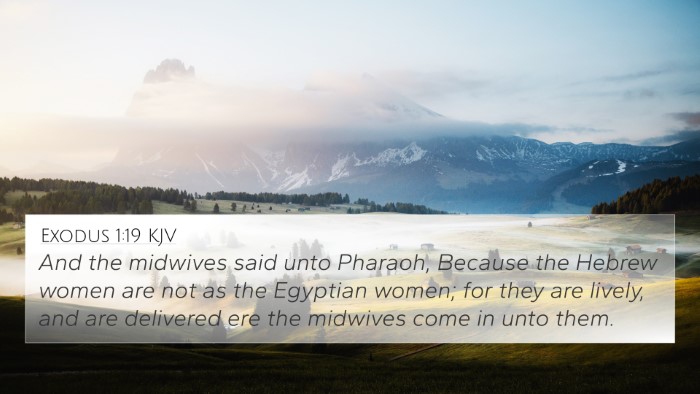
Exodus 1:19 (KJV) »
And the midwives said unto Pharaoh, Because the Hebrew women are not as the Egyptian women; for they are lively, and are delivered ere the midwives come in unto them.
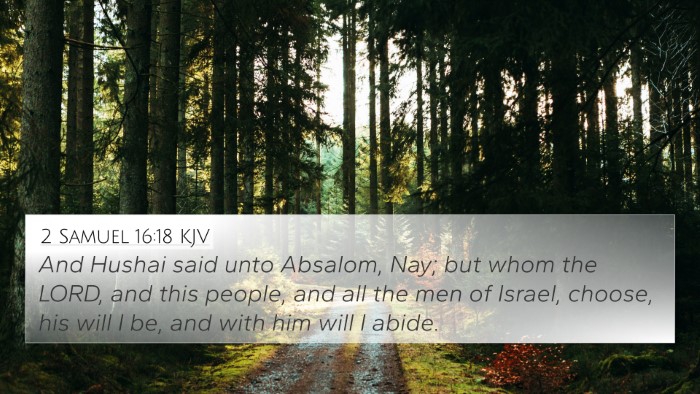
2 Samuel 16:18 (KJV) »
And Hushai said unto Absalom, Nay; but whom the LORD, and this people, and all the men of Israel, choose, his will I be, and with him will I abide.
Joshua 2:4 Verse Analysis and Similar Verses
Understanding Joshua 2:4
Verse: "But the woman had taken the two men, and hidden them, and said thus, There came men unto me, but I wist not whence they were." (Joshua 2:4)
Summary of Context and Meaning
The story of Rahab in the book of Joshua highlights themes of faith, protection, and redemption. Rahab's actions in hiding the Israelite spies can be viewed as a pivotal moment, not only for her life but for the unfolding narrative of the Israelite conquest of Canaan. In this verse, we see how Rahab deceived the king's men to protect the spies, showcasing her courage and resourcefulness.
Key Themes
- Faith in God: Rahab’s faith in the God of Israel is implied in her decision to protect the spies despite the potential dangers of doing so.
- Protection and Deliverance: The act of hiding the spies places Rahab in a position of risk, yet her actions ultimately lead to her and her family’s salvation.
- Divine Providence: This passage demonstrates how God uses unexpected individuals in His plan for His people.
Commentary Insights
Matthew Henry: He notes that Rahab's actions display not only bravery but a burgeoning faith in God. Rahab, a Canaanite woman, becomes a model of faith, illustrating that God’s mercy extends beyond the expected boundaries of His chosen people.
Albert Barnes: Barnes emphasizes the significance of Rahab's lie in the context of her faith. He argues that while lying is typically sinful, Rahab’s context reflects an extraordinary situation where protecting the lives of the spies transcended the ethical norms of her society.
Adam Clarke: Clarke reflects on the physical and spiritual implications of Rahab’s hiding the spies, noting that her actions were motivated by a conviction she was developing about the God of Israel, framing her as a central figure in the lineage of redemption.
Cross-References
This verse can be connected to several other Biblical texts that enhance its understanding:
- Hebrews 11:31: "By faith Rahab the harlot perished not with them that believed not, when she had received the spies with peace." This New Testament verse highlights Rahab’s faith as an extraordinary example.
- James 2:25: "Likewise also was not Rahab the harlot justified by works, when she had received the messengers, and had sent them out another way?" This verse reaffirms her actions as just and faithful.
- Matthew 1:5: "And Salmon begat Boaz of Rahab..." This genealogy shows the significance of Rahab in the lineage of Christ, emphasizing her redemption.
- Joshua 6:25: "And Joshua saved Rahab the harlot alive, and her father's household, and all that she had; and she dwelleth in Israel even unto this day; because she hid the messengers which Joshua sent to spy out Jericho." This ultimately declares her salvation and inclusion in the family of God.
- Exodus 1:17: The Hebrew midwives resisted Pharaoh's order, paralleling Rahab's courage in standing against authority for a righteous cause.
- Esther 4:16: Esther’s recognition of her calling can be compared to Rahab's understanding of her role in God’s plans through her courageous act.
- Romans 10:14-15: Highlights how messages are received and the necessity for the spread of God’s Word, paralleling Rahab’s acceptance of the spies and God’s message.
- Psalms 87:4: "I will make mention of Rahab and Babylon to them that know me..." This shows Rahab's significance being recognized among the nations.
- 1 Peter 2:9: "But you are a chosen generation, a royal priesthood..." illustrating God’s inclusion of people from all backgrounds.
- John 3:16: "For God so loved the world, that he gave his only begotten Son..." emphasizing that salvation is for all who believe, akin to Rahab’s situation.
Thematic Connections
The actions of Rahab serve as a nexus for understanding faith and redemption in Scripture. The following themes emerge from her story:
- Faith and Obedience: Rahab’s faith leads her to action, which is a common theme among other Biblical characters.
- God's Grace to the Outsider: Rahab, a Canaanite, exemplifies how God's grace is accessible to all, paralleling themes found throughout the Bible, especially in the ministry of Jesus.
- Transformation: Rahab’s transformation from a harlot to a vital part of God’s plan underscores the theme of renewal present in Christian theology.
Conclusion
Joshua 2:4 is a pivotal moment in the narrative of Israel’s conquest of Canaan, revealing themes of faith, divine intervention, and the power of choices made under pressure. The commentary provided by renowned theologians helps us to interpret this verse in the larger narrative of Scripture, establishing a web of connections and themes that facilitate deeper understanding. By cross-referencing with other relevant verses, readers can comprehend how interconnected the Biblical text truly is, revealing a rich tapestry of faith that weaves through both the Old and New Testaments.
